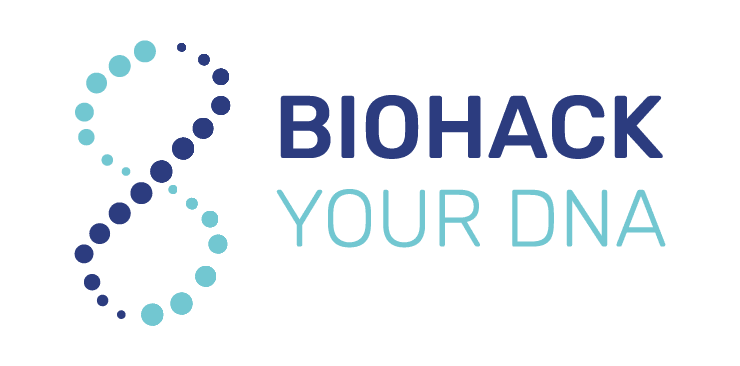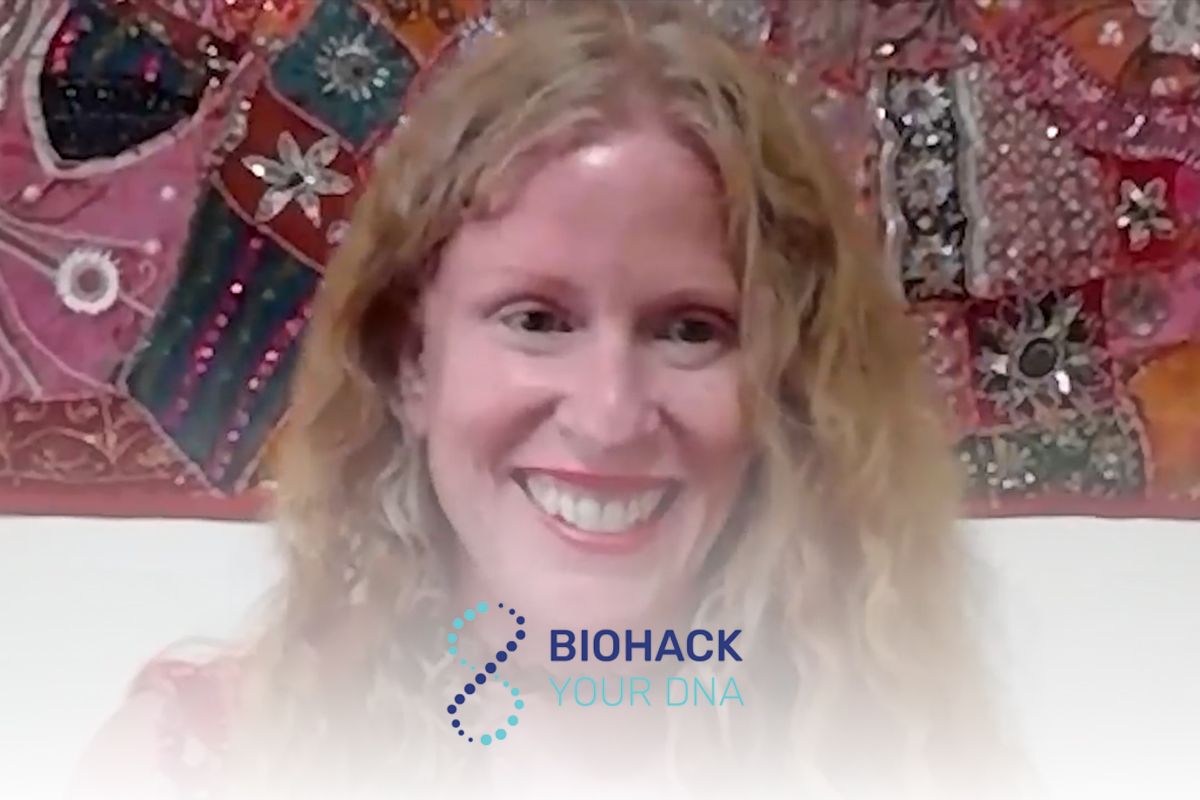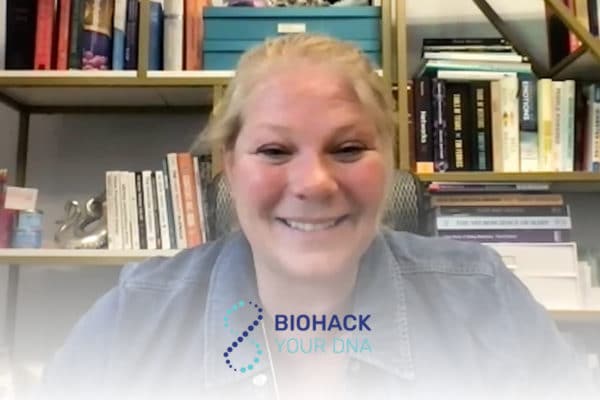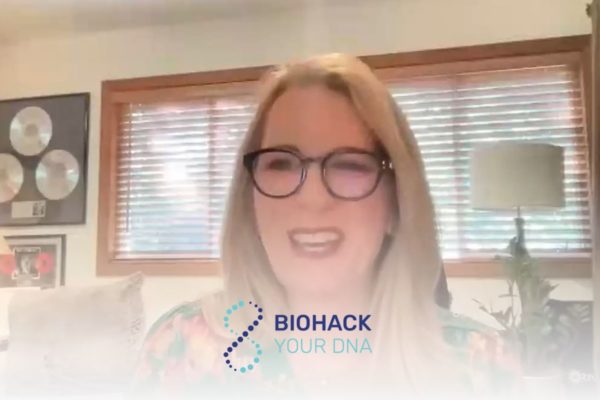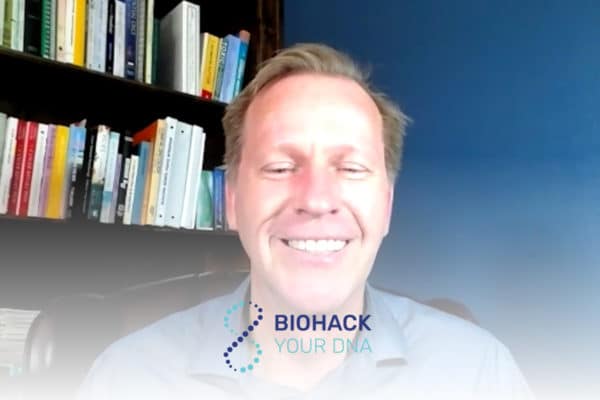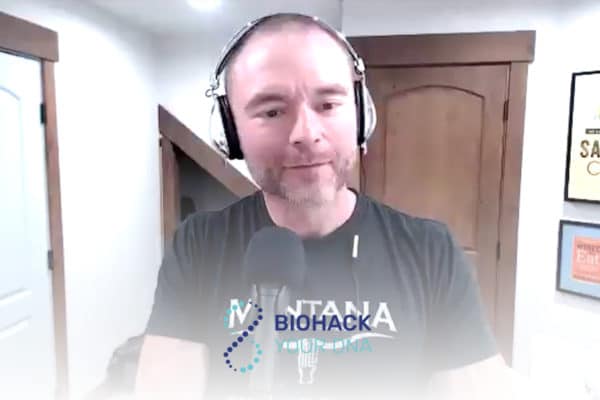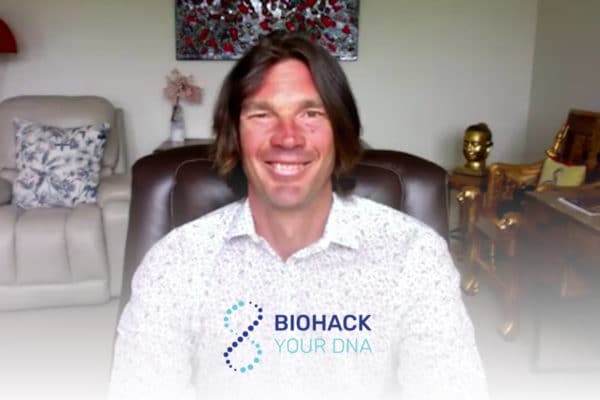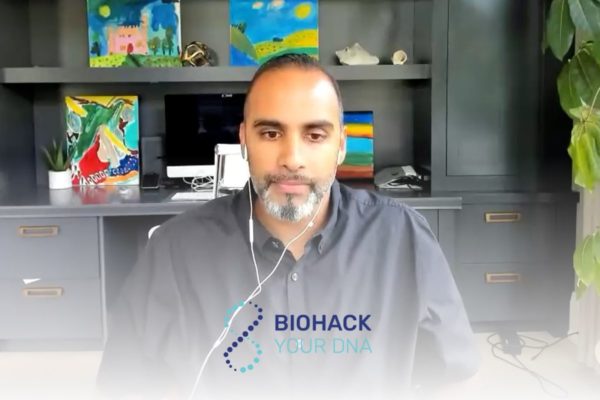Join the discussion below
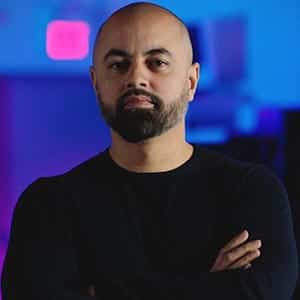
Kashif Khan is the Chief Executive Officer and Founder of The DNA Company, where personalized medicine is being pioneered through unique insights into the human genome. With the largest study of its kind globally, The DNA Company has developed a functional approach to genomic interpretation overlaying environment, nutrition, and lifestyle... Read More
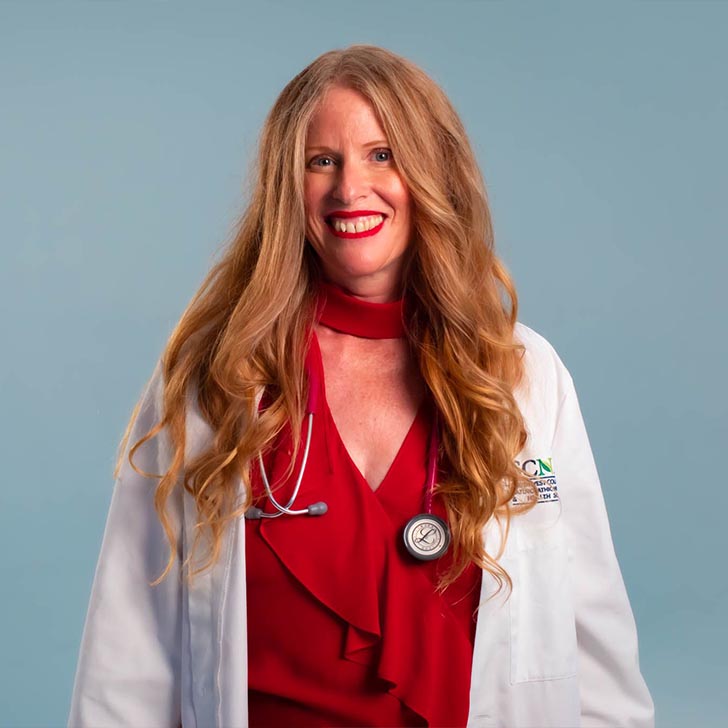
Dr. Sharon Stills, a licensed Naturopathic Medical Doctor with over two decades of dedicated service in transforming women’s health has been a guiding light for perimenopausal and menopausal women, empowering them to reinvent, explore, and rediscover their vitality and zest for life. Her pioneering RED Hot Sexy Meno(pause) Program encapsulates... Read More
- Does Menopause have to be like mom’s nightmare
- How do we have a happy hormone journey
- Is breast cancer hereditary
Kashif Khan
Hello, everyone, welcome back again, thank you. And if you’ve noticed the funky background and the lack of proper manicuring of this beard, it’s because I happen to be in Mexico and the one person that I’m interviewing while I’m here ’cause it was such a pleasure to actually connect with her and be able to do this is Dr. Sharon Stills. Thank you for joining us.
Dr. Sharon Stills
Thank you for having me and thanks for coming to chat while you’re on vacation.
Kashif Khan
Yeah, I know, it was a pleasure. I mean, we had to get this done and this was the time that worked and the honor of actually being able to interview you and get that knowledge out there to share with everyone is awesome, so again, thank you for joining us.
Dr. Sharon Stills
Ah, thank you, pleasure.
Kashif Khan
We’re gonna dive into something that we did briefly chat to a couple of other people about, but your perspective is so unique that we thought we had to cover it again because it’s such a big topic. Right now, so much of call it suboptimal or poor health outcomes and all these things that women are complaining about are tied to their menopause, but the way they’re being dealt with them is these, depending who you talk to, there’s 40, 50, up to 80 or 100 different symptoms of menopause are all being treated as separate siloed problem. And so we wanted to make sure we brought you on to speak about this because some people are blind to what’s actually happening to them and you can really help them.
Dr. Sharon Stills
It’s really a medical tragedy how women are treated in their hormonal journey. And so I definitely am on a mission to shed light around that and to change the conversation and to change how women are actually experiencing menopause and how they can let go of a lot of fear that is fed to them that just really isn’t true.
Kashif Khan
Yeah, for sure, for sure. And your experience is gonna be a blessing here. You know, you talk about menopause and one of the things you talk about when you’re out there, you’re saying it doesn’t have to be like mom’s menopause, that thing that you take for granted that it’s just gonna happen, you know, mom, grandma, whatever. What do you mean by that? What should women be thinking about?
Dr. Sharon Stills
Yeah, that definitely is something that I personally experienced, and I’ve been practicing for over 20 years helping women through their hormonal journey, and so I’ve seen so commonly, because we have to remember, as I’m sure you’ve talked about, that our genetics are not necessarily our destiny, right? And so what our mother’s experience, so I’ll talk about my mom personally just for a second. My mom was bleeding heavy, had a hysterectomy, had a horrible transition and that’s because no one ever saw her, no one ever realized that her progesterone was low and she was estrogen dominant and that her liver wasn’t clearing and her bile wasn’t moving and on and on and on. And so that’s why she had that experience. Very, very different than the experience I had where I, literally because I pre-gamed so early on that I went through menopause a little on the earlier side, I was 48 so that’s about six years ago, but I never even had a hot flash, I never. I actually feel better now than I did in my younger years when I was a hormonal mess. And so it doesn’t have to be that way, it’s just like the same if someone in your family has a history of diabetes or cardiovascular disease and you eat differently and exercise differently and think differently and detox differently and all these things, then that does not have to be your destiny. And so can we, if your mother went through a natural menopause, can we kind of say, okay, she went through around age 53, that’s about the age I should expect? Yeah, we can use that as a guidepost, but it’s not set in stone. And if your mother suffered, it doesn’t mean you have to, it just means you have to look at your hormones, your transitions in a very different light and that you have to get most likely different kind of support and medical care.
Kashif Khan
Yeah, this is huge because when it comes to things like diabetes, like you mentioned, and like some cardiovascular diseases, the belief is already, it’s kind of like we’re going back to the ancient knowledge we used to have, which is we don’t have to have these things, they’re lifestyle diseases and we can prevent them, if we have them, we can sort of shut them off or reverse them. But when it comes to menopause, that belief in the mainstream isn’t there, it’s that it has to happen, I have to go through hell for a few years, it’s just part, it’s considered a phase as opposed to a condition. And what’s what ends up happening is in that phase you’re experiencing a condition because you didn’t, like yourself, prepare for it.
Dr. Sharon Stills
Exactly, menopause, it’s like taxes and death it’s inevitable, if you are female, you’re gonna have it occur. And so it’s just a matter of changing what you think about it and getting the right support. So for instance, I see women all the time who are afraid to take hormones because of their genetic history, because their mother had breast cancer. And I’m like, no, no, no, no, no, you probably need hormones more than anyone ’cause most often breast cancer is not an issue with having hormones, because if it was an issue with having hormones, we’d see when we go through puberty and we have all this estrogen come on board, we’d see a lot of breast cancer and we just don’t see that. So it’s an issue with imbalanced hormones or it’s an issue with your hormones not detoxing properly, it’s an issue with not supporting your liver, it’s an issue with not being emotionally and energetically sound and happy. And so I use bioidentical hormones all the time to prevent breast cancer, to treat breast cancer, to deal with someone who’s worried about recurrences. And so it’s a matter of understanding what your genetics are.
So are you gonna be prone to not methylate or do you have a COMT SNP and do you need help around supporting so that your estrogens go down the right pathways and things of that nature? But once you have that information, bioidentical hormones are just a game changer, and they’re a game changer, whether it’s breast cancer or whether it’s osteoporosis or whether it’s cardiovascular disease or diabetes or whether it’s just wanting to improve your mortality. And so I really, it makes me so sad, I have so many women, I just had a patient the other day, she has a history of breast cancer and was told she couldn’t be on hormones, she’s been suffering for close to 10 years, sleepless nights, anxiety, depression, the whole gamut. And so I’ve been working with her, we’re looking at how does she detox, making sure she gets the right hormones because some estrogens are actually anti-inflammatory and they actually treat breast cancer, they help to support. And so I’m changing her life right now because she’s getting the treatment she needs and not just being told that blank societal, you can never touch hormones, you just have to suffer, this is how it is, that’s your genetic past and this has to be your genetic future.
Kashif Khan
That’s so cool. What you’re speaking of is truly personalized medicine. A lot of people, so for example, when you talk about the blanket statement that don’t be afraid of hormone therapy, it doesn’t cause breast cancer, but there’s a whole other layer of work that you’re doing that other clinicians or even consumers need to learn as they, call it the primary filter or what directs how they do their protocols, so it’s awesome that you’re doing that. Even just looking at the COMP gene, one simple thing, one simple SNP that can drastically alter the end sort of pipe of your methylation, but also work with hormone clearance. And if you don’t understand this one thing, how quickly do you get rid of stuff, you don’t understand how much to put in. And it’s awesome that you’re doing that for women. So how do you then integrate that with somebody that’s suffering from breast cancer is now going for their allopathic treatment, they have to go for that acute response with their clinician and their clinician is hearing through their patient that you’re working on something over here with hormone therapy and they’re saying, “That’s not in the toolkit, that’s not what we’re supposed to do.” How do you make that all fit together?
Dr. Sharon Stills
Very carefully. So it really depends. Some patients just use me as their primary oncologist, as a naturopathic oncologist, which is what I prefer, in the 20 years I’ve been doing this, I see much better results. But in those who are choosing to do some conventional and want to marry it with the alternative, then it’s a conversation, it’s an openness. And so if you have an oncologist who is not open to you working with someone who’s gonna work with you on a deeper level, then it’s probably time to get a new oncologist. And I hate to say that, but it’s kind of the truth. We work for you. So as physicians, we work for you, you listeners, if you’re a patient, we are here to be of service to you, we’re here to be a team for you. And if someone doesn’t want to play in the sandbox, then they’re probably not a good team member, and it’s kind of the same thing I see with oncologists not wanting you to take supplements when you’re going through, if you’re choosing to go through traditional treatments. And to me, that just, it makes me sad because we know, the data’s there, it’s even in PubMed, there’s studies, you can find it, that certain supplements actually will help chemo work better, that certain supplements will protect your gut and things of that nature.
And so if an oncologist is just blanket stating you that you can’t take supplements ’cause they’ll interfere, that means they haven’t done their homework and they’re not educated in that area. And if they’re not educated in that area, that’s fine, not all of us want to like spend every weekend in a conference continuing our education, but at the very least they should trust that you’re working with someone like myself or another naturopathic oncologist who understands and you can work together. So it’s the same with hormones, it’s the same with going through menopause. It’s really apples and oranges. And the other thing that’s so confusing is that a lot of times women are being told about hormones and they’re being told about synthetic hormones and apples and oranges is really when we have synthetic hormones and we have bioidentical, it’s two different animals. There is no comparison, they’re very different.
Kashif Khan
So how are they so different? ‘Cause a lot of people don’t understand that. They’re looking at price, right, they’re looking at what’s convenient and easy. So what is the big difference?
Dr. Sharon Stills
Well, the synthetic ones come from pregnant horse urine. And so anyone has a horse who’s watching, that might be good for you, it actually probably isn’t because what they’ve actually shown is that even horses who aren’t pregnant still don’t do well with the pregnant horse urine, that even the estrogens in the pregnant horse urine are very different than a horse that’s not pregnant. And so just translate that to us humans now. So these equilines that are in the horse urine, we don’t make these. So the bioidentical ones are just that, they’re bioidentical to what we create in our own bodies. So our receptor sites recognize them and can utilize them rather than, I remember my early training in bioidentical hormones was with Dr. Jonathan Wright, who I consider the grandfather of bioidentical hormone replacement in the states.
He wrote the first script for Bi-Est and he’s really been a leader in the field. And so I remember being in one of his lectures and him saying, “The synthetic ones are like space alien molecules. They’re just weirdly shaped and they can’t fit into the receptor site.” And the bioidentical ones, our body goes, oh, I know what this is, I’ve seen this before, I can utilize this, I’m gonna invite this in to have an action in the cell. And so we hear a lot, oh you can’t trust the bioidentical ones because they’re compounded and they’re not regulated and you just need to work with a good compounding pharmacy and then they are totally fine, I’ve been using them for over 20 years and never had a problem.
Kashif Khan
So the synthetic ones, because they don’t fit and they’re misaligned to what our receptors need, is it that they don’t, because we don’t bind or receive them, they don’t work, or is it more that there could be an adverse outcome, like a problematic outcome?
Dr. Sharon Stills
They will work to a point sometimes, it really depends, but there are a myriad of side effects that come with them where I just don’t see, the only side effects I see from bioidentical hormone replacement is positive ones, is feeling better, is sleeping better, reversing bone density, getting your brain function back, so all good things. So I’m all for side effects, I just like ’em when they’re good.
Kashif Khan
Yeah, that makes a lot of sense. And you know going back to what you were saying earlier about supplement usage and sort of combining what you do with what the oncologist may be saying, just some advice to people that people will hear, “No, you can’t take supplements.” And the question then is is it that you can’t take supplements blanket statement or is it the particular one being offered? Because medicine doesn’t actually say that. If you look at statin use, a doctor will tell you go take a CoQ10 supplement because it depletes your stores of CoQ10 and you need some, right? So that’s a clear example of our medicine says you need supplements to combine with what you’re doing over here, not only the efficacy of the drug is gonna be better, but it’ll reduce side effects, et cetera. So just one statement like that opening up the clinician’s mind to like, don’t say no to supplements, let’s be a little more precise, right, let’s dig a little deeper ’cause they, one challenge with academia is not so much what is the information, but who did it come from? And so if you can get ’em an example that’s from their own team, you might get a better response.
Dr. Sharon Stills
Exactly, and if you have a doctor saying take CoQ10 with your statin that’s a pretty enlightened doctor ’cause a lot of the typical primary cares won’t even say that. And then I would, of course, as a naturopathic physician say, well, do you really have a statin deficiency or do we really need you to be on that med and what can we do? And I know we’re not talking about cholesterol, but cholesterol is related to hormones and it’s the foundation from where the hormones are created. And cholesterol has gotten such a bad rap, it’s like the black sheep, I don’t know why, but, I mean I think I know why, I think it’s ’cause they’re trying to sell a lot of statins, but we actually need cholesterol. Cholesterol’s really important for hormone production. So if you’re having problems with your hormones and you’re on a statin and your cholesterol has been reduced down to like 120, that’s way too low for cholesterol. There’s nothing wrong with having a healthy, robust cholesterol. It’s really more about the ratios and it’s more about your inflammatory markers and things of that nature.
Kashif Khan
Yeah, that’s amazing that you’re, I’m just thinking about how lucky your patients are to work with you because the stuff that you’re saying in terms of the reality of how the body works versus these siloed interpretations of all these little problems without understanding the biochemistry and how this piece actually fits in the puzzle, like cholesterol, you can’t make hormones without cholesterol. So you get rid of your cholesterol, what’s happening to your hormones? It’s pretty straightforward, right? The equation isn’t that complicated. You don’t have the foundational ingredient, you’re not making the stuff you need. But more importantly, like you said, elevated cholesterol numbers are a sign of inflammation, not a sign of a cholesterolemia. Cholesterolemia is the response, it’s not the disease. It’s when you don’t deal with the inflammation for year after year after decade after decade after decade that you start to get this sort of buildup of blockage or whatever that leads to cardiovascular disease. But why not rethink about what cholesterol actually means? It’s your body screaming out saying there’s inflammation somewhere and I’m trying to fix it. This hormone, cholesterol is trying to fix it.
Dr. Sharon Stills
And cholesterol is so important for our brain function and for cellular walls, we need it for fluidity, for getting the good stuff in, for getting the bad stuff out. And so yeah, we’ve really, there’s so many things we’ve been misled on and hormones is one of them, cholesterol is certainly another one of them. And cholesterol, before they had TSH, which is thyroid stimulating hormone, so looking at pituitary action of thyroid hormone, cholesterol used to be used as a marker. And so if someone had high cholesterol, it was a sign that maybe their thyroid was underfunctioning. And so there’s so many different ways to interpret cholesterol. And one other thing I’ll just throw out ’cause it’s clinically interesting and helpful for the listeners is I always get blood panels, like extreme blood panels, 30 tubes of blood panels on my patients every year. And one of the things I always do is a cholesterol panel and I’m tracking it from year to year. I know we all want our cholesterol to be low, but if you have a significant cholesterol drop, it goes from 200 to 140 and you haven’t been taking cholesterol meds or supplements to lower it, that is often a sign that you’ve got extreme free radical activity going on. And one of the things I think about, oh, is there a cancer developing here? So just something good to pack away in your minds and look at ’cause a typical doctor won’t tell you that, but you now are an educated audience and you can know that for yourselves.
Kashif Khan
Yeah, it’s brilliant how you’re reinterpreting the same exact biomarkers for a completely different context and purpose. And now all of a sudden it becomes so much more functional. That’s brilliant. Going back to what you’re saying about breast cancer, so from what I heard you say, it sounds like the hereditary nature of how we look at it is maybe less implicit than we think. Is that true? Should we be scared of mom’s breast cancer?
Dr. Sharon Stills
We should be aware. So if mom had breast cancer, we want to, if we’re lucky enough to understand why, if she’s still with us and we can do some testing, we want to be aware. We want to know what the genetic predisposition is so we can actually interfere and make it different, make it a positive outcome. So it’s not that we shouldn’t look, but we should use that information not to go into fear but to go into action. So one of the most important things with hormones is how you’re monitoring them. And so I see this continually done improperly. And so you have to monitor through 24 hour urine testing and you have to monitor the metabolites. And so for example, the 4-hydroxy metabolite of estrogen is the one that has the most DNA damage and is correlated the most with breast cancer. So we want to know, are you metabolizing down that pathway? Because if you are, it doesn’t mean we have to stop hormones, it means we need to shift the way you’re metabolizing, through your diet, through supplementation, through how we change your hormones and what we’re giving you. And so it’s really just about having knowledge. So I feel like a lot of times when we get scared off, it’s because we don’t understand the whole picture. And when we understand the whole picture, then we actually have, we’re empowered and we have this wonderful tool. Like 2-Methoxyestradiol, it’s been used for years in Europe as a treatment for breast cancer. It’s one of the metabolites that I measure when I do urine testing and I can see, is it low, is it high? And so we need all this information.
If we don’t have the information, then we get lost and we get distracted. But say, I get sad when there are preventative mastectomies taking place because we get our gene testing done and we’re BRCA positive and we get scared and so we cut off our breasts, but that doesn’t really solve the situation, just like even if you have breast cancer and you get a mastectomy and I understand sometimes that’s what we need to do if there’s a large tumor and we need to remove it, but if you don’t change your terrain, if you don’t change the internal milieu of your body, the breast cancer will reappear. It might not appear in the breast, but it’ll appear in the chest wall. And so we can’t just cut out a body part and expect things to change. We have to change the milieu. We have to change the extracellular space that the cells are bathing in because in my opinion, and in my extreme training in bioregulatory medicine for over 20 years in Switzerland and Germany, that’s where health really begins. It’s what’s the condition? What is the alkaline balance of the extracellular space? What is the mineralization? What is the fascia doing? Is the lymphatic system flowing? How is our thoughts? Because our thoughts can be very acidic and very damaging to the body. Are we hydrated? Are we getting sunshine? Are we meditating? Are we sleeping? This is where we really make changes in our body.
Kashif Khan
Yeah, it’s amazing ’cause what you’re talking about is the why, which is exactly, that reaction of mastectomy is because the belief is what, I have breast cancer, I have risk of breast cancer, meaning I have risk of breast cancer, right, this thing is what causes cancer, if I cut it off, I’m safe, without ever understanding why it even happens. And that big gap, unfortunately, is the current protocol. That’s the current toolkit of prevention is cut it off ’cause if you remove the jurisdiction, maybe it won’t happen.
Dr. Sharon Stills
So I run thermography scans, I do computerized regulation thermography, which is a diagnostic tool from Germany that I use. And one of the main reasons I do it is because it’s enables me to look at the health of the breast. And so one of the things that I’m looking at is the lymphatic system. It’s the only diagnostic tool I know about that actually tells you what the state of the lymphatic system is. And we know that the lymph being congested is a huge predictor of breast cancer. We also know that there are, that the breasts are part of the body. We exist as a whole being, not as a breast or a kidney or a liver. And so I can also see when I’m using my thermography, if someone has a clogged liver, if someone has ovary issues, there are all these different pieces that set up the terrain for a potential breast cancer to occur. And lymphatic congestion is, it’s out of control. I see it, on every new patient, there is always some degree of lymphatic congestion that’s affecting the breasts. And so we really need to be looking systemically at the whole being. And another big piece with breast cancer is teeth. And so the upper molars are related, they’re on the stomach meridian.
And so every tooth is connected to a meridian through acupuncture, and the stomach meridian runs right through the breasts, and so the breast is connected to the stomach meridian. And so these upper molars are the stomach meridian and we see frequently, and I mean frequently, root canals in this tooth when there’s a breast cancer diagnosis, and often being preventatively with my thermography, I can see issues there and we can get it taken care of and prevent a breast cancer from occurring. But we have to be thinking about our teeth and the connection, and so I’ll give you another take home, if you haven’t had a root canal, never have one, it is much better to pull the dead tooth than it is to have a root canal and cause a low grade chronic infection that’s gonna just suck all the energy out of your immune system. If you have root canals, I do recommend getting them looked at from a biological dentist. All my patients have to have their root canals pulled, they have to be pulled properly, and then we have to think about zirconia implant and what we’re gonna be doing, but our teeth are a huge part of how our health expresses itself.
Kashif Khan
Wow, that’s incredible because you’re truly looking at it, like multifactorial, functional in nature, like this is what the body’s doing, right, this is why it happened. And there’s so many whys that you’re slowly bringing to the table, more than I’ve heard of. I want to go back to something you said earlier about the 4-Hydroxy estrogen. So it’s really cool that you’re looking at the metabolites, estrogen metabolites, and understanding or helping your patients understand which ones are potentially toxic and what is their DNA driving in terms of that pathway, right? Where do they net out? What bucket are they filling? So I heard you say that if somebody is in that 4-Hydroxy bucket, that’s what they make, their genes drive that, and we can predict that with their genetics if we have their test done, that you can alter expression with certain foods, other lifestyle recommendations. So what are you telling these people that sort of, and is it actually truly affecting genetic expression or is it more about clearance and getting rid of the estrogen toxicity or both?
Dr. Sharon Stills
Right, so it’s expressing what’s happening after the gene, so it’s changing, it’s kind of like someone directing traffic and being like, okay, now you’re gonna go to the left, you know, the right road is closed. And so we can use cruciferous vegetables, we can use glutathione, we can use sulforaphane, that’s always a mouthful, which is broccoli sprouts. We can look at what is the estrogen you’re being given. So I give a lot of estriol, which is E3, which is actually hits the estrogen beta receptors, so it’s actually inhibitory as opposed to estrone and estradiol, which are more proliferative and make things grow. And so we kind of got taught that estrogen is only proliferative, but that’s not true. It actually has other properties as well. And it definitely, I will see someone’s urine results, I will give them a protocol, we will recheck it in three, four months, and we will see the levels change. And so then we just track and we watch and we see.
I test patients who are on hormones, at least once a year, they have to have a 24-hour urine hormone test done with me or they don’t get their hormone refills because I want people to be safe and I want them, I say that hormones are really important, but they have to be properly prescribed, they have to be properly administered, they have to be properly monitored, and we fluctuate, sometimes we need a little more, sometimes we need a little less. Sometimes we’re under a lot of stress and things change. And so we have to always be watching. You can’t just go on hormones and then go on your merry way. You really have to be working with a doctor who’s gonna be there and support you and watch and monitor. And if you’re just being monitored in blood, you’re not getting your metabolites and you’re not getting the full picture and it can be very misleading. I’ve had patients come in who were just monitored on blood and they were told they were on too many hormones and they were taken off and then they were suffering with symptoms and it’s just because it’s not an accurate way to monitor.
Kashif Khan
So then, when you’re doing this measurement and you’re doing sort of the consistent checking, the status, like you said, to make sure things stay safe, how do you deal with sort of the variability of day of the month, what did they eat, what did they do, like the epigenetic expression of their hormones because of what you can’t control the day before they came to you? Are there instructions there? Are there certain days? Are there certain things you do there to manage that?
Dr. Sharon Stills
So with the woman who’s postmenopausal, it’s not as important when you collect, but I guess I didn’t mention, so I’m kind of really strict with my patients. Anyone can take hormones and feel better, but I’m the kind of doctor if you’re taking hormones with me, we’re also making sure your bile is moving and your liver is detoxing, we’re making sure your lymphatic system is moving, we’re making sure you’re sleeping, you’re hydrating, your moving your body, you’re saunaing, you’re detoxing, you’re on good supplements, you’re on a healthy diet. And if you’re not and you’re not behaving, I take your hormones away. I’m a naturopathic physician, so I am not about just giving something to get rid of a symptom, I am about really changing how we live and what our lifestyle is. And I saw this in my clinic for years, women are not so quick, they don’t want to refill their supplements or whatever, but they want to refill their hormones all the time because you take the right bioidentical hormones, you’re going to feel different, you’re going to feel better. And I’m like, that’s great, but you gotta do the work to earn it. So if you’re just taking hormones but you’re not changing the way your genes are expressing, especially if you have SNPs where you shouldn’t have them and you don’t detox well, then I don’t feel comfortable just supporting that. Like I want you to change your life, I want you to do the work and live healthy so you really can live a long time because if you just take hormones and you don’t do the other stuff, it’s not gonna give you that expanded lifespan that we’re all looking for. And when I say expanded lifespan, I don’t just mean quantity, I mean quality.
Kashif Khan
Yeah, I mean what you’re referring to as strict is actually exactly what is missing from the experience that made people so sick to begin with. That’s exactly what people need. It’s not just prescribe and hope, it’s management. Health isn’t visits, it’s everything in between. If you’re not allowing them to self-manage and get stuff done in between, it’s gonna be a lot more visits, right, dealing with problems.
Dr. Sharon Stills
Exactly and I practice what I preach. I rarely, if it’s something I can do, I do it. I don’t expect patients to, I’m not telling you to do this and then going off to Dunkin Donuts. I live this way so I know it works and I believe in it, and I’ve seen it with so many patients over the years.
Kashif Khan
Yeah. The program that you run, you call it, and I love the name, The Red Hot Sexy Meno Pause Program. And I paused there because you literally separate the pause and that’s so cool ’cause you’re literally telling women let’s stop it in its tracks. Like I’m sure a lot of women come to you when they’re already in pain, they waited too long. So you’re saying that even for a woman that has now entered menopause and is starting to feel horrible, you can slow things down or even stop them and get her into a better state?
Dr. Sharon Stills
Yeah, so actually pause to me is literally about pausing. And so it’s literally about using this opportunity to reflect on your life and to really think about, because we, I was gonna say as women, but I’ll say as humans, we are kind of like, we go, go, go and we don’t stop or think about our health. Like no one wakes up, I mean maybe there’s a few, but very few people wake up and are like, I feel amazing today, I’m gonna get on the phone, I’m gonna call Dr. Stills and see what she can do for me. Patients come to me when they don’t feel good. And so a lot of times, unfortunately, women don’t feel good around menopause, the hormones are plummeting and the symptoms are expressing. And so I like to also remind women that this is a time, not only that our cycle is pausing, but that we can pause our lives and we can really reflect upon where we’ve been, where we are, where we’re going, that there’s a lot of power in slowing down, that there’s a lot of power in just exhaling and really thinking about our journey and what we want it to be like. And so I kind of use this time, as we’ve got these symptoms, which I call sacred messengers, there are a way that the body’s saying hello, I need some attention, and then it can really reflect upon our whole journey, emotionally, mentally, spiritually, and what we want to do. And we have to remember, that especially from a native perspective, that when we are no longer losing our blood to the earth, when we are retaining blood ’cause our menstrual cycle has paused, that we are retaining wisdom and that we are now in this new phase of life where we retain wisdom and we should be revered. And that’s another thing that we don’t respect or embrace or enjoy our elders in this society. And I’m really about changing that story where we really take our place as being wise women and men.
Kashif Khan
Yeah, that’s so cool ’cause when I think about what you said, I immediately actually thought about myself and realized that I do this when it comes to work and stress, but people don’t translate that you can, or I just shouldn’t say translate, don’t consider that this is a right that they have when it comes to their health. For example, you see like how many women will hide in their car with a cup of Starbucks to just be away from the kids for like 10 minutes, right? How many women or even men or whoever will shut their laptop off to just get the emails away so they can focus on a project and just get it done? So you know already that this pause and focus allows you to take this load off your mind, off your body, cortisol goes down, everything sort of settles and then you can actually perform. But when it comes to health, we think about pain is out of our control, problems out of our control, or my body is doing it, it’s just happening, right? And it’s the what not the why again. The what is I have this problem, it’s part of me, I have it, it’s my identity now as opposed to why is it happening? Why don’t I get rid of it? So that pause, I just want people to be able to reflect and understand how important that is. You already do it probably daily for other reasons. You don’t do it here because the belief is that you can’t, but you can.
Dr. Sharon Stills
It’s the best medicine, the pause, that’s why I say the power of the pause, it’s the best medicine. And when I, if I get sick, the first thing I do is say, okay, why does my body want me to rest? Where am I out of alignment? Where am I pushing too much? I had a weird back pain the other day and I was like, okay, like what’s going on? Why is my body talking to me? What do I need to listen to? And so I like that to be the first question we ask ourself. I remember when my kids were young, they’re older now, my oldest son is actually a naturopath now, but when they were young and my patients used to always say, “Well what do you do when your kids get sick?” And I’m like the first thing I do is nothing for 24 hours. I mean I watch them, but I just let their body express and see what’s going on, I don’t suppress, I don’t give Tylenol, I just let their body, we tend to suppress things, and I’m not saying to run 106 fever, but 102, 103 fever, that is a natural body response, that is your immune system. And when we constantly suppress it, it leads to autoimmune disease, it leads to cancer, it leads to a lot of issues. One of the most common things I hear patients who are dealing with cancer say to me, “I don’t understand, Dr. Stills, I’ve never been sick, why do I have cancer?” And I’m like, “That’s part of it because your immune system stopped learning how to respond and react.” And so it’s good to have a cold or a flu once a year, twice a year, I’m not saying every other week, but it’s a good thing to get sick, it means your body is releasing, it’s detoxing. And so if you’re not detoxing, if you don’t sweat regularly or you don’t, your body doesn’t know how to sweat, you have to really look at why are you not detoxing? And that’s where looking at the genetics is so helpful because sometimes we can see, oh, it’s because genetically, your body is impaired and so we have to give a little extra support.
Kashif Khan
Mm, yeah, man, everything you’re saying is so brilliant. So it sounds so simple and easy, but we don’t do it. You know, we don’t, we literally just don’t pause to do it. So for anyone listening, that’s saying, okay, it sounds like I can take control and do things, what does a happy hormone journey look like? If you start from, puberty hits you, you realize that your body’s changing, all the way to, I want to have a healthy menopause, what is a woman doing to prepare, like you did? You had the menopause of your dreams, right? What does that journey look like?
Dr. Sharon Stills
And like I said, I was a hormonal hot mess. I had PMS that was, there’s 30 days in a month, I was suffering like 21 of those days, it was horrific. So I mean it starts with your kids. It starts with celebrating when they get their period and not calling it the curse, but really celebrating it, having a ceremony, it starts with not using birth control pills. So if your daughter is having an issue and she goes to a doctor and she’s told to get birth control pills, time to run because birth control pills are very damaging, they’re synthetic. I see a high correlation with cancers developing down the road with women who have had extensive birth control use. So I won’t work with anyone who’s on birth control pills, I will help them get off of them, but if someone wants to stay on ’em, I really can’t help them. And so you want to make sure that you’re having normal cycles. And we say normal is 28 days, but everyone can be a little different. You don’t want to be having, if you’re having symptoms and you’re getting exhausted when you bleed or you’re very premenstrual or you get migraines, these are all signs that your hormones are out of balance and you want to work with someone who’s gonna help you to balance them, who’s gonna make sure you’re eating right, getting the right nutrients, that you are detoxing properly.
You know, we talk about estrogen dominance, that is very common when women are younger and when they’re in their cycling years. So we want to make sure the exogenous, the toxic estrogens are getting out of your life, you’re not using body care products and cleaning products that have estrogens, you’re not drinking or eating out of plastic, you’re certainly not using a microwave and putting plastic in it, and so we’re doing all of these sort of things. If you choose to want to have children and you’re having trouble with fertility, again, you want to work with someone who has training like mine where you don’t have to go to those harsh fertility meds, which I also see a lot of correlation with problems down the road. Sometimes infertility is a low thyroid, which leads to low progesterone, those are two of the most common things, it’s stress, it’s not eating a proper diet, it’s cortisol levels that need to be controlled. And so there are a lot of things that need to be looked at, it’s heavy metal toxicity.
So again, I go back to the teeth and do you have amalgams? So if you want to get pregnant, my favorite patients are the ones who come in and they’re like, I want to prepare, I’m planning on getting pregnant in two years, and then I can check their heavy metals, I can check their nutrition, I can check their cortisol levels, because if you get pregnant and you have heavy metals, which most of us do at this point unfortunately, your baby is a great chelator so you’ll give the metals to your baby. And so you want to make sure you’re as detoxed as possible before you get pregnant. If you are stressed out and you’ve burnt out your cortisol levels and you get pregnant, in the third trimester when the baby’s cortisol production starts ramping up, you’re gonna steal that cortisol because you need it and then your baby’s gonna be born hyperadrenic. And so if you’re on this journey and you’re thinking about getting pregnant, it’s great to like really work and get your body ready so you can have a healthy pregnancy, so your baby can have a healthy pregnancy. Once you’re through having children if that’s what you chose to do, then perimenopause, you need to remember can start early. It’s not when you’re 48, it can be when you’re 35.
So if you are having symptoms, if you don’t feel like yourself, if you’re not sleeping, if your weight is off, if your hair is falling out, if you’re having hot flashes, if you’re having urinary tract infections, if you’re having headaches, on and on and on and someone tells you it’s not your hormones, go find someone else because there’s a chance there’s a hormonal involvement, so we need to change that story that perimenopause is only in your late 40’s. And then you just want to, like I said, I started pre-gaming because when I was in my early 30’s that’s when I started my medical practice. Suzanne Somers book had just come out and someone brought it to me and they were like, “I want these.” And I was like, all right. And I read the book and I thought, okay, I can even do this better as a naturopath, so I started help, I helped her. And all of a sudden, she told one woman who told two women who told like that old shampoo commercial, and I had a practice full of menopausal women who I was helping and they were like reverse aging in front of my eyes and they were feeling so good and all these things. And I thought, wow, I’m helping all these women and I’m dying with premenstrual issues right now, I better position to heal thyself, I better put some of this, so I started working on my own hormones, balanced my hormones, no more PMS, felt great. And that’s why, because I had pre-gamed, as I say, I was able to go through menopause and just have this beautiful transition and that’s what I truly want for all of you is to have a beautiful transition.
Kashif Khan
That is awesome. It’s amazing that the proof’s in the pudding, like you’ve done it, so it’s not theoretical. You’re saying, hey, it can be done. Compare you to your mother, you know, black and white, like it’s very different because of the work you did that she didn’t know she should do. So for anyone listening that wants to work with you, how do they, I don’t even know if you accept patients or how does someone work with you?
Dr. Sharon Stills
I take a limited amount of new patients. My website is drstills.com and our information is on there, I’m on social media, all the places you find someone. I also have a, if you’re really interested in the more bioregulatory aspect of things and the extracellular matrix and all that, I do host a podcast called “The Science of Self Healing” through the Bioregulatory Medicine Institute, which is a nonprofit. And we are just dedicated to spreading the word about bioregulatory medicine and how it can help you so you can check out the podcast, too. I have lots of great interviews on there, we have a lot of fun there.
Kashif Khan
That’s awesome. I’m actually gonna listen to that myself. Yeah. Oh and thank you so much. This was amazing, as expected with the work you’ve been doing, I was expecting for our minds to be blown and they were. So thanks for joining us. This was awesome, a pleasure, great talking to you.
Dr. Sharon Stills
Thank you, enjoy the rest of your vacation.
Kashif Khan
Thank you.
Downloads
